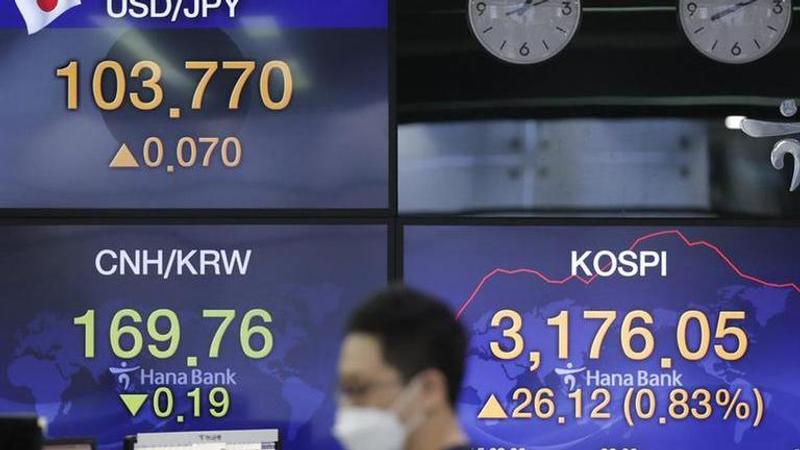Published 17:30 IST, January 15th 2021
Asian shares follow Wall St lower as traders mull Biden plan
Asian shares fell Friday after a worse-than-expected U.S. jobs report and a late slide in several Big Tech stocks left major indexes lower on Wall Street.

Advertisement
Asian shares fell Friday after a worse-than-expected U.S. jobs report and a late slide in several Big Tech stocks left major indexes lower on Wall Street.
U.S. futures lost ground after President-elect Joe Biden announced his plans to propose a $1.9 billion package to help along a recovery from the coronavirus pandemic. Biden spoke about the plan after Thursday’s market close.
Biden's coronavirus plan would include $1,400 checks for individuals, on top of $600 provided in the last COVID-19 bill. The plan would also extend a temporary boost in unemployment benefits and a moratorium on evictions and foreclosures through September. It also provides funds for a mass vaccination campaign and a major expansion of local public health efforts.
Markets have been mostly charging higher recently amid growing optimism that the rollout of coronavirus vaccines will set the stage for a big rebound for the economy and corporate profits later this year. Expectations are also rising for another round of stimulus coming for the economy because Democrats are set to soon have control of Congress and the White House.
Investors are hoping that more government stimulus can tide the economy over until COVID-19 vaccines get daily life back toward normal and trigger a powerful recovery later this year.
But the hopes are tempered by the reality that Biden may struggle to win support for massive spending, even from some Democrats, analysts say.
“To some extent, most of this optimism had been priced in, but the huge figures had also invited some contemplation as to whether the necessary bipartisan support will materialize for this huge sum," Jingyi Pan of IG said in a commentary. “The market appears to be playing it safe," she said.
Sentiment was also clouded by U.S. decisions to blacklist several Chinese companies. Chinese smartphone maker Xiaomi Corp., CNOOC, China’s third-largest national oil company and aerospace company Skyrizon are the latest to be blacklisted or delisted from U.S. stock markets for alleged military links. President Donald Trump’s administration has been moving to raise pressure on Beijing during his last week in office.
Japan's Nikkei 225 slipped 0.6% to 28,518.65 and the Hang Seng in Hong Konglost 0.3% to 28,405.72. In Australia, the S&P/ASX 200 was flat at 6,715.40. South Korea's Kospi skidded 1.8% to 3,093.29, while the Shanghai Composite index shed 0.6% to 3,543.64.
Thursday on Wall Street, the S&P 500 fell 0.4% to 3,795.54. The benchmark index was weighed down by losses in Apple, Microsoft and other huge tech companies.
The Dow Jones Industrial Average slid 0.2% to 30,991.52. The Nasdaq composite edged 0.1% lower, to 13,112.64. The indexes are still close to their record highs set last week.
The retreat followed another discouraging report showing how much damage the economy is taking as the pandemic worsens. Last week, 965,000 more U.S. workers filed for unemployment benefits as businesses shutter and lay off employees. That’s up sharply from the prior week’s tally of 784,000, and much worse than economists expected.
Smaller companies jumped more than the rest of the market, as they often do when investors are upgrading their expectations for the economy. The Russell 2000 index of small-cap stocks rose 2.1% to 2,155.35.
The yield on the 10-year Treasury was 1.11% early Friday, down from 1.13% on Thursday but above its 1.07% level the day before. The 10-year yield was at 0.90% less two weeks ago, before two runoff elections in Georgia gave control of the Senate to Democrats.
In other trading, U.S. benchmark crude oil gave up 29 cents to $53.28 per barrel in electronic trading on the New York Mercantile Exchange. It climbed 66 cents to $53.57 on Thursday. Brent crude, the international standard, lost 46 cents to $55.96 per barrel.
The dollar slipped to 103.81 Japanese yen from 103.82 yen on Thursday. The euro weakened to $1.2139 from $1.2155.
___
AP Business writers Stan Choe, Damian J. Troise and Alex Veiga contributed.
17:30 IST, January 15th 2021




